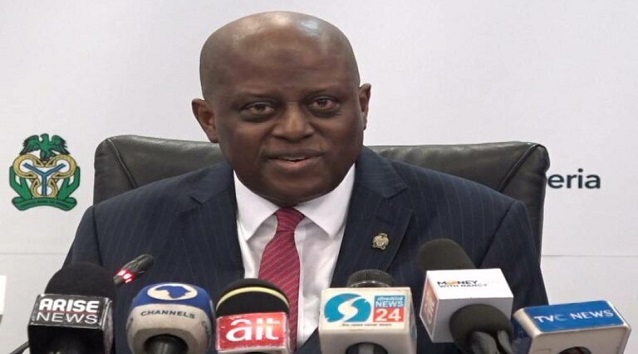E-Financial
Fidelity Bank Stock Record over 20 Percent Growth Following Combined Offer

Growing investor confidence and strong market participation have continue to boost optimism about Fidelity Bank’s stock as the bank experienced a remarkable 20% surge on the Nigerian stock market, with its share price surpassing the N13 mark by the third week of September.

Dr. Nneka Onyeali-Ikpe, GMD, Fidelity Bank
This upward trend follows the bank’s combined offer, which included a Public Offer and Rights Issue launched on June 20, 2024.
The combined offer consisted of 10 billion ordinary shares priced at N9.75 for the public and 3.2 billion shares at N9.25 for existing shareholders, collectively raising N127.1 billion. After a consolidation period from June to August, coinciding with the close of the combined offer, Fidelity Bank’s shares have gained over 20% month-to-date (MtD) in September.
Fidelity Bank has maintained a robust bullish trajectory since August 2018, when its stock dipped below N2. Since then, it has surged by more than 680%. The bank started trading in 2024 at N10.85, with 900 million shares exchanged.
However, uncertainties related to recapitalization efforts among major Nigerian banks led to a temporary decline to N9 per share in April. Despite this setback, the stock regained its upward momentum after touching a low of N9.00.
Following the completion of the combined offer in August, Fidelity Bank’s share price climbed once again, gaining over 20% by mid-September. A key factor contributing to this latest surge is the successful combined offer, which paves the way for an upcoming private placement.
The Fidelity Bank combined offer, which was the first in the current recapitalization phase in the banking industry, saw significant demand, prompting an extension that added 8.2 billion shares. Of these, 5 billion were sold through the Public Offer and 3.2 billion via the Rights Issue.
This high demand resulted in increased market activity, with over 2 billion shares traded in June and 3 billion in July.
As the combined offer concluded on August 12, the stock entered a consolidation phase, but trading activity picked up notably by mid-September. Weekly trading volumes reached 27 million shares, pushing the stock past the N13.00 threshold, sustaining its upward trend.
In a recent note to investors, Dr. Nneka Onyeali-Ikpe, bank’s Managing Director, expressed gratitude for the strong response to the capital raise, stating that, “With the conclusion of the Combined Offer, I am delighted to announce that we have met and surpassed our capital-raise target for the first phase of this exercise.”
“My profound gratitude goes to our customers, new investors and existing shareholders for supporting us in this journey. We will forever be grateful for the support we received during this capital-raise exercise.
“Our deepest thanks go to our regulators namely the CBN, Securities and Exchange Commission (SEC) and the Nigerian Exchange Limited (NGX): the CBN for its vision of recapitalizing Nigerian banks to ensure banks have sufficient capital to sustain a $1tn economy in the near future and improve the overall confidence in the banking industry; SEC and the NGX for the role they played in ensuring the seamless execution of this first phase of our recapitalization plans.”
E-Financial
Kuda Bank Teams Up with Lovers & Frnds for Inclusive Valentine’s R&B Bash

Kuda Microfinance Bank partnered with Lovers & Frnds for a Valentine’s edition event on Sunday, February 15, at Space Hub Lekki, Lagos, redefining celebrations around love, friendship, and social connections beyond romance.

Kuda Bank
The R&B-themed gathering drew couples, friend groups, and solo attendees with music sets from DJs like TGarbs, games, gift exchanges, and colour-coded tags—red for relationships, yellow for mingling singles, orange for non-minglers—to spark easy interactions.
Kuda activated a branded photo booth, merchandise giveaways, prize activities, and complimentary drinks for Premium loyalty tier customers, while vendors used Kuda Business POS terminals for seamless cashless payments.
Senior Brand Manager Emmanuel Femi-Adejobi said: “We partner with experiences matching our customers’ lifestyles in music and entertainment, creating spaces they genuinely connect with—we’ll keep supporting how they live and celebrate.”
E-Financial
CBN Cuts MPR by 50bps to 26.50% as Inflation Eases for 11th Month

Central Bank of Nigeria (CBN) has lowered its Monetary Policy Rate (MPR) by 50 basis points to 26.50 percent from 27 percent, a unanimous decision announced by Governor Olayemi Cardoso at the end of the 304th Monetary Policy Committee (MPC) meeting in Abuja on Tuesday.

CBN
Cardoso cited 11 straight months of decelerating headline inflation—reaching 15.10 percent in January 2026 per National Bureau of Statistics—as key, driven by prior tightening lags, naira stability, food supply gains, steady petroleum prices, export earnings, remittances, and balance of payments strength.
Liquidity ratio stays at 30 percent, CRR unchanged at 45 percent for commercial banks (16 percent merchant banks) and 75 percent non-TSA public deposits; standing facilities corridor now +50/-450 basis points around MPR.
The MPC retained other parameters, welcoming Executive Order 09 redirecting oil/gas revenues to the federation account for fiscal boost, last cutting rates in September 2025 after November’s hold.
E-Financial
Retiree Slams N50m Suit against over Alleged Privacy Breach, Unauthorized Accounts

Abiodun Olokunjuwon, a retired civil servant based in Ibadan has instituted a N50 million lawsuit against Moniepoint Microfinance Bank at the Oyo State High Court, alleging that the fintech company opened unauthorized bank accounts in her name without her knowledge or consent.

Filed in February 2026, the suit is among the first significant cases testing the enforcement of the Nigeria Data Protection Act 2023 against a Nigerian fintech institution.
According to the statement of claim, the plaintiff became aware of the alleged unauthorized accounts only after her legitimate bank account was restricted pursuant to a garnishee order linked to a debt she denies incurring.
The restriction reportedly prevented her from accessing funds needed for essential transactions.
The claimant alleges that Moniepoint opened two separate accounts in her name using her National Identification Number (NIN) and Bank Verification Number (BVN) without proper authorization or verification.
Following the discovery, she submitted a Data Subject Access Request (DSAR) under the NDPA 2023. Documents allegedly provided by the bank, according to the suit, revealed significant verification lapses.
The plaintiff claims the accounts were opened using falsified documents, including what she describes as a fake NIN slip and contact information unrelated to her.
She further alleges that the accounts listed a Lagos residential address where she has never lived.
The suit contends that Moniepoint failed to implement adequate identity verification and address confirmation procedures before creating and operating the accounts. It further alleges breaches of statutory obligations under the NDPA 2023, including:
- Failure to ensure personal data processed was accurate and lawfully obtained
- Failure to implement appropriate technical and organizational security measures
- Failure to prevent unauthorized or fraudulent processing of personal data
The claimant maintains that these alleged lapses resulted in serious personal and financial harm.
The plaintiff is seeking N50 million in damages for emotional distress, health complications, and disruption to her financial life.
She is also asking the court to order the permanent closure of the allegedly unauthorized accounts.
No date has been fixed for hearing on the matter.

 General News2 days ago
General News2 days agoZinox Technologies and TD Africa Forge Strategic Partnership to Revolutionize African Tech Ecosystem

 Telecom2 days ago
Telecom2 days agoUwaje Pays Tribute to Leo Stan Ekeh @70

 E-Financial2 days ago
E-Financial2 days ago$214Bn Missing, Institutions Silent: Is Accountability Dead in Nigeria?

 Telecom2 days ago
Telecom2 days agoCyber Immunity Emerges as Shield for Nigerians Amid Rising Scams

 General News2 days ago
General News2 days agoNITDA, Abia Partner on Enterprise Architecture Reform

 E-Business2 days ago
E-Business2 days agoInterswitch Partners Abia to Digitise Public Hospitals

 E-Business2 days ago
E-Business2 days agoWIEG 2026 Summit Shifts to April 22-23 for Maximum Impact

 News1 day ago
News1 day agoNITDA Urges Stronger State Partnerships as Key to Digital Economy Goals @ South-South Stakeholders Forum
























